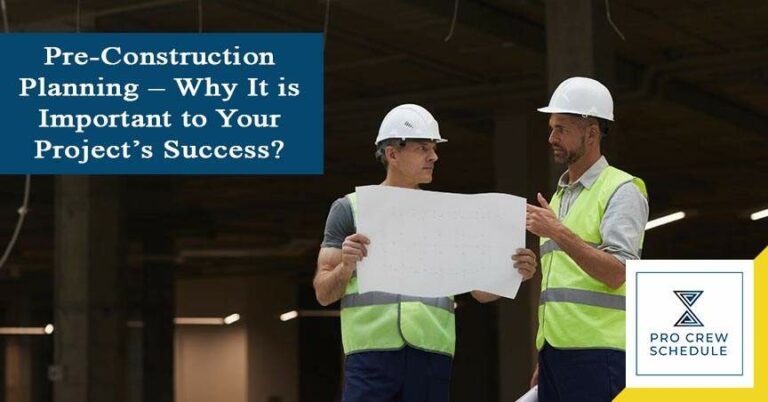A critical aspect for successful construction projects is selecting a wide array of elements, including a great team, design, materials, etc. Early planning allows everyone to benefit from the feasibility, cost history, construction methods and resources, subcontractor inputs, and etc. Just like the importance of the project’s physical foundation, pre-construction planning lays the foundation of the project’s success.
During pre-construction, important decisions are to be made and measurements for success are established to maximize project efficiency further and reduce possible obstacles. The best construction company is the one that offers its clients the most value to the project, especially during the pre-construction stage, guiding the budget, schedule, designs, etc.
Do you pay closer attention during the pre-construction stage of your projects? How detailed and hands-on are you during this stage? In this blog, we focus on pre-construction planning, its different outputs, and some of the significant benefits it gives that are helpful for your project’s success.
What is Pre-Construction Planning?
Pre-construction is the preliminary form of strategizing that is typically done before a job begins. The main goal in this planning is to fully understand and build the project’s overall scope, including its requirements.
A complete planning phase typically includes the project identification, definition, and possible issues, milestones, scheduling, scope, extraneous requirements, cost estimation, and the while analysis for needs. It’s also when project managers and contractors will have relevant information with clients to help them decide and choose if whether they follow the said plan.
This construction phase ensures that project goals and requirements can be accomplished in a timely manner while remaining within the budget. Your company and your people have to be ready to implement a strategic plan to ensure any unforeseen events and schedule changes are managed correctly without compromising the project’s overall success.
Outputs of the Pre-Construction Phase
During this stage, you and everyone involved will plan out the important components of the project.
1. Project Scope
Defining the scope of the project is the very first step in pre-construction. The scope of the project is the most critical road map you and your team can set.
This is where you can start asking questions, like “What is it that you wanted to accomplish, and what are the schedules, the space, and level of finish requirements needed in order to meet your goals and objectives? Other questions include “Is it described clearly? Is it all agreed by stakeholders?”
2. Project Budget
Once you have built preliminary project objectives and goals, your team needs to understand your project budget further. The construction and design teams are expected to work together to deliver designs and cost information, including costs and alternative solutions, to firm up the project budget.
Another important fact that you need to know is that, statistically, large projects come in at a whopping eighty-five percent over the budget. Whether you are at the top of the chain, everyone in the process sets and operates under the said budget. Overall, ensure your budget reflects the resources you have available rather than being aspirational.
3. Project Details
With a more precise project budget and scope, your team can proceed with design plans for the layout, size, character, building materials, quality, systems, and other critical project details. Once designs are finalized, a plan can then be created for executing every phase of construction and a schedule assembled for the entire project.
4. Project Team
This is where your company’s role in pre-construction becomes even more visible as the project often moves toward the final stages of design. So, to properly prepare bid packages for the many parts of the job, you should determine potential subs who have the skills and abilities to complete work on the project. You should start engaging with these top talents to confirm their availability and interest.
In terms of bidding out the job, make sure to have a ready pool of subs who fully understand the project and know what to expect from them.
5. Projects Permits and Inspections
Pre-construction is the stage where you should thoroughly plan and asses to mitigate any risks associated with the construction project, including evaluation of the permits, inspection requirements, construction site, and any other situations that should be resolved during and before construction. You should have a detailed checklist with you during the pre-construction stage. A construction punch list is also needed during post-construction. Both checklists are referred to interchangeably, but, in actuality, they are different and have different purposes.
Here are some of the most common items you can presume to cover during the pre-construction phase:
- Planning the designs
- Initial meeting to discuss the construction project
- Estimating costs
- Offering cost-saving options
- · Site selection and study feasibility
- Determine any options for value engineering
- Evaluating soil conditions onsite
- Scheduling management
- Identifying equipment and tools required
- Checking existing facilities and utilities
- · Outlining contingencies for both contractors and clients
- Life-cycle analysis
The checklist above is essential. It is also necessary to ensure all the boxes are checked even before the project breaks down.
Project Communication
The Pre-construction stage lays the foundation for successful construction projects. This stage heavily relies on effective communication between all parties involved. So, take time to prepare a communication plan that effectively works for everyone. Perhaps, you do not need a communication plan anymore because you can integrate everybody with subcontractor scheduling software.
One of the most significant benefits of this software solution is that it vastly enhances internal communication and adaptability. It easily streamlines and improves every single part of regular communication, which is important during pre-construction.
6. Project Schedule
Creating an accurate project schedule is the primary key in making sure how your construction projects will be constructed. Assigning a specific deadline to every task and milestone creates the key blueprint for holding your consultants responsible and keeping your project on target.
Two of the most asked questions for a project schedule are:
- How is the schedule developed?
- Are crucial constraints and milestones determined?
Consider creating a cost-loaded schedule and scheduling training to associate your timeline and budget if you want a more detailed project plan.
7. Project Materials
Properly planning for longer lead-time materials can either make or break a construction project schedule. So, during pre-construction, you need to determine all the necessary equipment and materials for the job, with extra attention to some items requiring early purchasing and how they can be acquired.
The schedule will be worked into the entire construction schedule to ensure and fully maximize efficiency, proper delivery, staging, and phasing of all construction materials. For materials and other stocks, make use of web-based inventory software. This specialized software tool allows you to visually track all your supplies, quantity, location, and further details, for a more seamless way of tracking inventory for your project team.
Major Benefits of Pre-Construction
By being hands-on during the pre-construction, you can experience many benefits. There is absolutely no shortage of benefits when pouring the proper energy and time into early planning. Here are some significant benefits of pre-construction:
· A shared project vision
· Removal of various unknown variables for clients.
· They provide a much clearer picture of what the projects will look like and how each is done.
· Pre-construction provides contractors like you the privilege to present possible options for cost savings. It will ultimately benefit your clients.
- Early assessment of feasibility
- Fewer chances of going over budget
- Increased efficiency and better communication between teams
- Prevention of possible issues
- Improved client satisfaction
Evaluating all possible scenarios upfront will give your clients the confidence to partner with the right and competent people who know what they are doing. So, having realistic expectations can help avoid issues while the construction project is underway. It’s absolutely a real win-win for everyone.
Use Construction Scheduling Software during Pre-Construction
Without modern software for project management, you are forced to handle tasks and other aspects of your business and projects separately. And never it becomes a good thing to do during the pre-construction stage. This particular stage is both time-consuming and at higher risks for many errors. So be careful and mindful of every step you and your team takes.
This is why you need to consider adopting an advanced software solution like Pro Crew Schedule. Your project management, communication, processes, construction stage (pre-construction, construction, post-construction), etc., can all be significantly improved by integrating this software into your business.
Whether you are a project manager or an individual trade contractor, your construction processes can primarily benefit from integrating cloud-based software like Pro Crew Schedule.
Begin incorporating this software solution into your business and processes and see how it benefits you. Get started with a FREE live demo!
Key Takeaways
As this blog shows, the pre-construction stage is a very complex process. Prior to any construction, a vast amount of work has to be handled properly. So navigating the pre-construction stage effectively and efficiently is one great way to succeed in your construction projects. This only shows how imperative it is to be fully hands-on, especially at this stage.







